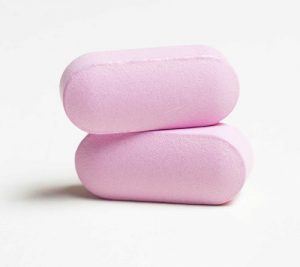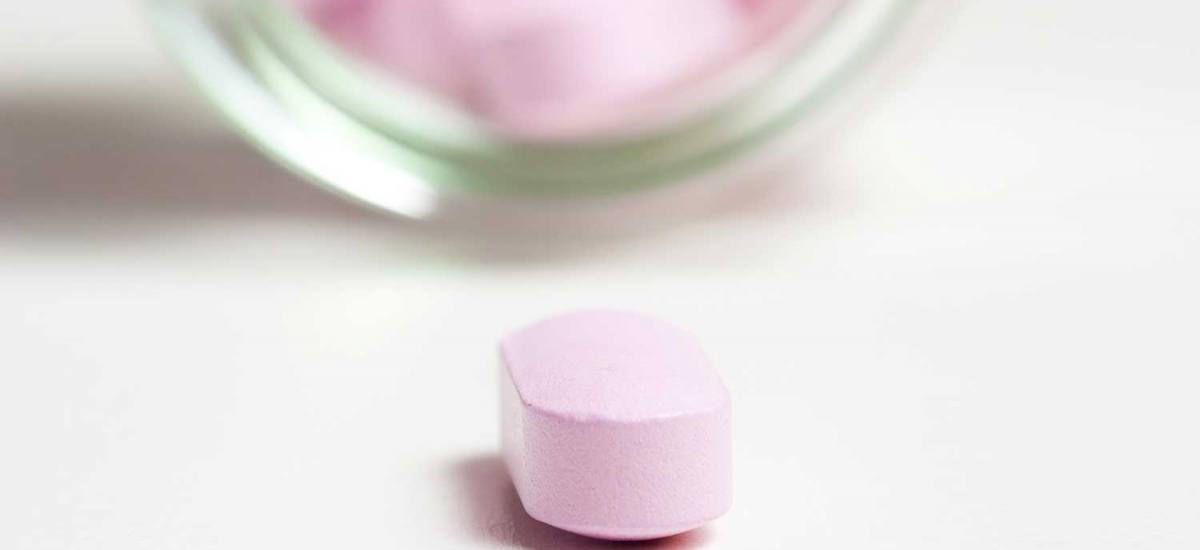It’s been touted as the female Viagra, destined to improve the lives of women troubled with low libido. Proponents happily exclaim that drug manufacturers have finally noticed the other half of the population. The media says this is the miracle women have been waiting for. Medical doctors? Well, they have a lot to say – but nobody’s mentioning a miracle. Not even close.
Last month, the Food and Drug Administration (FDA) approved flibanserin, the first-ever drug to treat female sexual dysfunction. The libido-increasing pill, named Addyi and produced by North Carolina-based Sprout Pharmaceuticals, has been billed as “the female Viagra.” But that, medical professionals say, is a potentially dangerous misnomer.
 “This is not the female Viagra,” says Jennifer Caudle, DO, a family medicine physician with RowanSOM. “The first thing to understand is that this is very, very different from Viagra in many ways.”
“This is not the female Viagra,” says Jennifer Caudle, DO, a family medicine physician with RowanSOM. “The first thing to understand is that this is very, very different from Viagra in many ways.”
Soon after the FDA approval was announced, Caudle, who frequently appears on television to deliver medical advice, was invited to CNN, where she discussed the difference between Addyi and drugs like Viagra. The most glaring distinction is that Viagra treats a physical problem – male erectile dysfunction – by triggering a physical response (increased blood flow to the penile tissue). Addyi isn’t meant to treat a physical issue, but a psychological one.
“This drug works in the brain, on neurotransmitters, and that’s how it’s supposed to help the sexual desire issue a woman might have,” Caudle says. “This medication does not improve sexual performance; it targets only the interest in having sex. Interestingly enough, even the FDA has said it’s not exactly sure how the drug works. I think we still have a lot of questions.”
Karolynn Echols, MD, program director of female pelvic medicine and reconstructive medicine at Cooper University Health Care, says she was shocked when she read that Addyi is indicated only for pre-menopausal women suffering from hypoactive sexual desire disorder (HSDD).
“So in basic terms, the women this will work on can have sex. Once they start to have sex, they can become aroused and have an orgasm, on their own, without medication. What this does is basically suppresses the hormones that prevent you from getting in the mood,” Echols says. “But there are a lot of reasons women can experience sexual dysfunction, and this only treats one. There’s sexual desire disorder, which it’s designed to treat, but there are also disorders of sexual aversion, arousal, orgasm and pain. Some patients have several of these disorders. Commonly, one is the result of another.”
“For instance,” Echols continues, “a woman could have decreased orgasms, but that disorder actually originates from a pain disorder. There are also a lot of other reasons a pre-menopausal woman can have a decreased libido. Birth control can decrease libido, so can depression and serotonin inhibitors used to treat depression. If a woman comes in, she’s pre-menopausal and she’s not on any medications that can be decreasing the libido, we do a full hormonal work-up. If there are no areas where we could be doing hormone replacement, then maybe this drug would work for her. But I think those patients are going to be few and far between.”
Echols says the most surprising aspect of Addyi is that it is not recommended for post-menopausal women who, she says, would be the best candidates for a libido-enhancing drug.
“This drug is indicated for only pre-menopausal women, and that is not the group of women who would benefit from a drug like this. It’s indicated as ‘experimental’ for post-menopausal women, which means insurance won’t cover it,” Echols says. “I’ve got to tell you, I don’t think they thought that through.”
Physicians aren’t the only ones who are skeptical about Addyi. The FDA rejected the drug twice, citing concerns about effectiveness – a study published in July found that only 8 to 13 percent of women would see an improvement – worries about side effects and doubts about the existence of HSDD. That final point prompted a strong political response and the creation of Even the Score, a lobbying campaign supported by more than a dozen major women’s health organizations, including the National Organization for Women, the American Sexual Health Association and the National Consumer’s League. Critics of Addyi maintain that the FDA caved to the political pressure from Even the Score, but the organization called the approval “an enormous step forward.”
“Women deserve the safety and peace of mind that comes with access to FDA-approved medical treatments for HSDD,” Even the Score chair Susan Scanlan wrote in a statement.
“Until today, women had zero medical treatment options for their condition, while men have enjoyed 26 options marketed for their own sexual dysfunctions. With approval of flibanserin, the FDA has recognized that equitable access to health care should be a fundamental right, regardless of whether you are a man or a woman.”
Caudle says the polarization surrounding the drug’s approval did not come as a surprise.
 “It’s a fact that there are many people who’ve been saying, ‘what about women?’ And they’re right – there are so many drugs for male sexual dysfunction on the market, and there’s been nothing for women,” she says. “I think there are a lot of things that make this drug really controversial. It’s the first medication of its kind, it’s something people have been asking for, it’s been denied twice before – you mix all that in a pot, and it’s a perfect storm for controversy.”
“It’s a fact that there are many people who’ve been saying, ‘what about women?’ And they’re right – there are so many drugs for male sexual dysfunction on the market, and there’s been nothing for women,” she says. “I think there are a lot of things that make this drug really controversial. It’s the first medication of its kind, it’s something people have been asking for, it’s been denied twice before – you mix all that in a pot, and it’s a perfect storm for controversy.”
Though Echols is glad the national conversation has turned to women’s sexual health issues, she thinks the approval may have come too soon for a drug that will help too few patients.
“The more I think about it, I think women should be a little bit angry,” she says. “It’s only treating a small subset. I don’t think that’s a step toward equality for all. I think it was rushed, and the politics and lobbying that rushed it didn’t take into account the complexity of female sexuality.”
Despite the controversy, Wendy Martinez, MD, supports the FDA’s approval.
“I think it’s absolutely the right time for the drug,” says Martinez, CEO of Advocare The Women’s Group OB/GYN. “It always seems like in the male world, they’re quick to find a solution, like the speed with which Viagra was approved. I think it’s long overdue that they actually developed a drug for women.”
Martinez thinks the approval of Addyi will open the door for more medications that target what she hopes will be different aspects of female sexual dysfunction.
“I think this is a start,” she says. “I don’t think it’ll be the be-all, end-all by any means. I think there’s a group of women that may get some benefit from this. But those women need to be really aware – you really have to watch the side effects.”
Those side effects, which were a major sticking point with the FDA, include dizziness, drowsiness and hypotension, a dangerous drop in blood pressure. These conditions can be greatly exacerbated by alcohol or through an interaction with any other drug that is metabolized through the liver.
Because of these side effects, the FDA approval came with a caveat: a boxed warning – the strongest type – for the drug’s label and a required risk evaluation and mitigation strategy program (REMS) for physicians and pharmacists who wish to prescribe or dispense Addyi.
“What the REMS program means is anyone who wants to be able to give patients this medication has to take an online course to become certified,” Martinez says.
“It’s unusual in that both doctors and pharmacists have to have their certification numbers, and they both are required to reiterate to the patient the dangers of putting this pill and alcohol together. It’s the only time I’ve ever had to do a REMS course for a medication like this, but I think that makes the FDA feel a little bit more comfortable having this medication out there.”
Echols worries that patients may not anticipate a negative interaction between Addyi and everyday medications.
“They’ll be told not to drink, but what if they take cough medicine or medication for reflux?” Echols says. “Even antihistamines can cause a severe negative interaction. On top of that, something like 75 percent of the population takes some kind of complementary alternative medicines, but even those aren’t safe with this drug. A big one is Ginkgo biloba – it’s a normal supplement for people to take, but it could be very dangerous mixed with this drug.”
Patients who do meet the criteria to be prescribed Addyi will have to commit to a completely alcohol-free lifestyle, Martinez says. Unlike Viagra, which is taken shortly before a man plans to have a sexual encounter, Addyi is a chronic pharmaceutical, which means it must be taken every day. Moreover, it isn’t effective until four to six weeks after a woman begins her daily doses.
“That’s one of the big things they’re not telling people,” Martinez says. “They’re calling this ‘the female Viagra,’ and making it out to be an instant miracle drug. They’re not telling people they have to take it for at least a month before it even has a shot at helping you. That will narrow the number of women who find it effective even further. I am looking forward to the other pill coming out.”
The other pill is bremelanotide (BMT), a drug for female sexual dysfunction being developed by the Cranbury Township-based pharmaceutical company Palatin. Now in its Phase III clinical trials, the drug will treat the same subset of HSDD that Addyi targets, but without many of the harmful side effects. And, like Viagra, it’ll be taken only when a woman needs it.
“Unlike Addyi, BMT doesn’t affect neurotransmitters directly, but instead works in the hypothalamus – the area of the brain that’s linked to sexual performance,” says Carl Spana, CEO of Palatin Technologies.
“The key difference is that BMT is an on-demand medication. It’s taken anywhere from 15 minutes to an hour before a sexual encounter. And there’s no four to six-week period before it’s active. The first dose of BMT will work.”
In addition, Spana says at this point in the trials, he doesn’t foresee any major side effects to BMT.
“We have done alcohol interaction studies, and we don’t see an interaction,” he says. “And just based on the class of medication BMT is, it won’t interact with the liver enzymes. So we won’t have those label restrictions.”
Despite the fact that BMT and Addyi will occupy the same niche, Spana not only does not view Addyi and Sprout Pharmaceuticals as competition, but was thrilled by the news of the FDA approval.
“Women have been waiting a long time for an option, and now they have something,” Spana says. “Beyond that, we got a clear statement from the FDA that this is a medical need. We never viewed ourselves as competitive. BMT represents a true alternative to Addyi, and one that women will need. Some women will not mind the chronic dosage or the alcohol interaction. Other women will say, ‘Listen, I really only want something when I think I need it.’ I think this is going to be a major market, and every drug will have its place.”
The biggest positive that will result from the approval of Addyi, Martinez hopes, is that more women will start discussions about sexual health with their doctors. While she knows she won’t be able to prescribe Addyi to every woman who asks for “the little pink pill,” she’s excited at the prospect of normalizing discourse about female sexuality.
“I’m pleased about it, because now there will be conversation,” she says. “I think there are a lot of women out there who think they’re the only one. What Viagra did for ED – making it normal – I think this will do for women’s sexual dysfunction. All these men who’d had this dysfunction all along would never tell anybody. Then they came out with Viagra and suddenly here’s all these men saying, ‘Yeah, I’ve got that.’ The hope is that other women will see this and realize, ‘It’s not just me.’”









